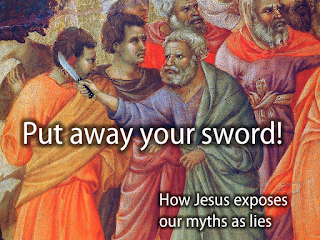Hespeler, 25 June, 2017 © Scott McAndless – Aboriginal Sunday
Joshua 9:1-20, Deuteronomy 28:1-6, 15-19
Joshua 9:1-2
Now when all the kings who were beyond the Jordan in the hill country and in the lowland all along the coast of the Great Sea toward Lebanon – the Hittites, the Amorites, the Canaanites, the Perizzites, the Hivites, and the Jebusites – heard of this, 2 they gathered together with one accord to fight Joshua and Israel.
| A |
nd it came to pass that a settler people came even unto this land and found that it was a rich and good – a land that was flowing with beaver pelts and lumber and many fish. And they knew that God had given this land to be a possession for them and for their children and for their children’s children until they became a people as numerous as the stars in the sky.
And lo there were nations that were in this land that God had given to the settlers. And these nations, the Iroquois, the Algonquin, the Cree, the Anishinaabe and many others heard of these settlers. But somehow they did not get the memo which said that God had given the land even unto them. And so these nations, each in their own way, sought t
And yes, there were some of the nations who found that it was impossible to live with these settlers among them and they chose to fight and protect the land of their ancestors. They were quickly and easily defeated.
And so it came to pass that the settler people began to believe that it would be an easy thing for them to possess this land that had been given to them. Surely the nations of the land would be quickly defeated or die from diseases before very long. Surely their “inferior” culture and “primitive” rituals and beliefs would be swiftly assimilated into the much “superior” culture and religion of the settler people. They took this to be an inescapable truth. Of course, their total dominance and possession of everything was assured.
But there was a problem for the short term. Sure, the people of these nations were certain to disappear and melt away eventually, but that would take time – maybe a few generations. But for right now, there were still too many of them and they were living on land that the people wanted for various reasons. They were looking for a solution.
Joshua 9:3-15
3 But when the inhabitants of Gibeon heard what Joshua had done to Jericho and to Ai, 4 they on their part acted with cunning: they went and prepared provisions, and took worn-out sacks for their donkeys, and wineskins, worn-out and torn and mended, 5 with worn-out, patched sandals on their feet, and worn-out clothes; and all their provisions were dry and moldy. 6 They went to Joshua in the camp at Gilgal, and said to him and to the Israelites, “We have come from a far country; so now make a treaty with us.” 7 But the Israelites said to the Hivites, “Perhaps you live among us; then how can we make a treaty with you?” 8 They said to Joshua, “We are your servants.” And Joshua said to them, “Who are you? And where do you come from?” 9 They said to him, “Your servants have come from a very far country, because of the name of the Lord your God; for we have heard a report of him, of all that he did in Egypt, 10 and of all that he did to the two kings of the Amorites who were beyond the Jordan, King Sihon of Heshbon, and King Og of Bashan who lived in Ashtaroth. 11 So our elders and all the inhabitants of our country said to us, ‘Take provisions in your hand for the journey; go to meet them, and say to them, “We are your servants; come now, make a treaty with us.”‘ 12 Here is our bread; it was still warm when we took it from our houses as our food for the journey, on the day we set out to come to you, but now, see, it is dry and moldy; 13 these wineskins were new when we filled them, and see, they are burst; and these garments and sandals of ours are worn out from the very long journey.” 14 So the leaders partook of their provisions, and did not ask direction from the Lord. 15 And Joshua made peace with them, guaranteeing their lives by a treaty; and the leaders of the congregation swore an oath to them.
| W |
hen the inhabitants of some of the nations saw that some of their neighbouring nations had been brought to a low estate they on their part acted with cunning – or at least it seemed that way from the settlers’ point of view. They went and prepared provisions and placed them in the bags and bowls that they had made according to their traditional methods in their villages. And they put on their traditional garments. These were beautiful things and well-made, but they looked poor in the sight of the settler people because they did not have the form of top hats and waistcoats, silks and satins.
And so the nations came unto the settler people and the settler people came up with the idea of making treaties with them. This was of great interest to the settlers because it would allow them to expand and possess much of the land that they believed that God had given them without having to deal with violence or resistance. But, of course, to make treaties, they would have to give the people of the nations certain lands and rights and resources. Perhaps in the future, some of those things that they gave them would get in the way of what they would want to do and it would get costly to fulfill everything that they promised.
But then the settler people looked at the items and the clothing that the people of the nations had cunningly brought with them and they were reassured. In their eyes, these things were an indication of a dying culture and a way of life that would soon disappear. And behold, the settlers said unto themselves, “Surely these nations will soon pass away. What does it matter if we give them land and promises, they will not be around long enough as distinct nations to stop us from taking back these things when we need them.”
And so the settler people made peace with them, guaranteeing their lives by treaties; and the leaders swore oaths unto them. They told them that their queen, who lived in a far-off land, would be a mother to them. “You will always be cared for,” they said, “all the time, as long as the sun walks.”
Joshua 9:16-18
16 But when three days had passed after they had made a treaty with them, they heard that they were their neighbors and were living among them. 17 So the Israelites set out and reached their cities on the third day. Now their cities were Gibeon, Chephirah, Beeroth, and Kiriath-jearim. 18 But the Israelites did not attack them, because the leaders of the congregation had sworn to them by the Lord, the God of Israel. Then all the congregation murmured against the leaders.
| W |
hen many days and months and years had passed after they
had made these treaties with them, the settler people heard something that disturbed them. It seemed that the people of the many nations had not disappeared or simply been assimilated as expected. At first, they thought that it was only a small setback. Surely the assimilation process only needed a little bit of encouragement. And so some plans were put in place. For example, they put in place a plan to take the children of the people of the nations away from their parents and put them in schools where they would be separated from their communities for many months or even years at a time. In this way, they thought, the culture and way of life would naturally disappear as parents failed to pass it on to their children. And anyways, the settler people reasoned, this would only be a blessing on the children of the nations who would be exposed to the “superior” culture and spiritual traditions of the settlers. Surely they were only doing it for their own good.
So the settler people put these plans and others like them in place, but things did not go as they imagined. The schools that they set up became places of great cruelty, which, when you think of it, is not all that surprising as the plan itself had a deep cruelty to it from the outset. Also, it turned out, breaking families apart and ripping children from their communities created and exacerbated many other social problems that would persist for generations including substance abuse, suicide and domestic violence.
And yet, despite all this, the people of the nations still stubbornly refused to disappear as expected. Though they still had little power, for some reason, it became harder and harder to ignore their grievances – and it turned out that there were many grievances.
And then all the congregation of the settler people murmured against the people of the nations. Some said that, if their communities had problems, then it was all their own fault, that they should clean up their own finances and politics before they looked to them for help. They also told stories about the people of the nations – said that they all drank or didn’t want to work or take care of their properties. When they spoke of the people of the nations in these terms, it just seemed so much easier to write them off.
But, despite all of this, it became clear that the people of the nations were not disappearing and would not disappear. All of this made the settler people complain against their leaders. “Why should we continue to abide by the terms of the treaties that we made with them?” they asked.
Joshua 9:19-20
19 But all the leaders said to all the congregation, “We have sworn to them by the Lord, the God of Israel, and now we must not touch them. 20 This is what we will do to them: We will let them live, so that wrath may not come upon us, because of the oath that we swore to them.”
| O |
ne of the most amazing people I have ever met is the Rev. Margaret Mullin. She is the minister of Place of Hope Presbyterian Church in Winnipeg. She is also a trained and recognized First Nations elder who has been given the name “Thundering Eagle Woman.” She is of mixed heritage – Scotch/Irish and Ojibway – and so she has a unique perspective on what it means to be part of both what I have been calling the settler people and the people of the nations.
When I met Margaret, she talked to us quite a bit about the meaning of treaties. First Nations people often see the treaties that their ancestors entered into as an essential part of their identity for good and for ill. This is not all that surprising because those treaties have a big impact on their daily lives. They tell them where they can live, what they can do on the land and what limits their livelihood. They greatly influence their choices regarding things like marriage, child rearing and custody. Many First Nations people carry status cards that define their rights and benefits based on the treaty terms negotiated by their ancestors.
The treaties all also have a great influence on how non-native people see First Nations people. Honestly, they are also the basis of many of the complaints and stereotypes that you hear.
What we miss, Margaret taught me, is the fact that there are always two sides of a treaty. What we miss is the idea that, if the First Nations are a treaty people, then so are we. For we too live day in and day out under the effects of these treaties. Most Canadians live on land that was acquired through a treaty. That is not precisely true here in Waterloo Region, of course. The land that most of us live on is part of the HaldimandTractt – land that originally belonged to three different nations. But the land was later given to the Six Nations of the Iroquois by the British Crown in appreciation for their extraordinary bravery and loyalty during the American Revolution.
So this land wasn’t part of a treaty but it was won by the Six Nations at exceptional cost. And, once they had it, their battle was not over for the government absolutely refused to allow them to set up any businesses on their land. The Iroquois wanted to become entrepreneurs like what they had observed in European society but the government absolutely refused to let them operate any business. The government didn’t even want to allow them to sell the land unless it was to another member of the Six Nations who couldn’t use it for business. They had to fight yet again just to be able to sell it to the people who eventually sold it to you and me. So we may not be living on treaty land here but we are living on land that First Nations people fought for and died for again and again and we are a part of that story of the land.
So it is not just First Nations people, we are all treaty people. It is just that we have often not been aware of it. And there is cost, but also a benefit of being a treaty people. The cost, as the Israelites learned in the time of Joshua, is that you have to keep the terms of the treaty even if the people do not behave as you thought they would. The Israelites understood that the consequences of breaking a treaty were serious. After all their relationship with God was based on a treaty – the covenant, they called it – and it was drilled into them that, as we read this morning, that many curses would follow on the breaking of that treaty. This was true of any treaty and these curses would have been recited when the Israelites made a treaty with anyone including the Gibeonites.
So God taught them to respect and keep the terms of a treaty. But it was also not just a question of avoiding punishment. There were abundant blessings that were available to all oath keepers. We see that in the first part of the responsive reading we made this morning. Treaties are hard, there will often be times when we do not want to live up to the promises made in them and it may be costly to do so, but God’s promise is that when we do so, the blessings that come to all will far outweigh any costs.
I would suggest, therefore, that we all start thinking of ourselves as a treaty people. Canada is a nation built through talks and treaties – not so much by wars and battles. And that is a very good thing, not only because of what we have been able to build in this country together, but because there is blessing that God offers to those who keep their oaths and promises at all cost. Those blessings should be Canada’s always. And indeed the blessings that First Nations people have brought to this country are abundant and amazing. They have contributed to our culture, our science, our communal life in more ways than we could possibly list. For this, we ought to be thankful to God.
Of course there is much work to do. Of course, there are still many ways in which we, as a people, fail to keep to the intentions of the treaties that we entered into. When opportunities to profit arise, we are far too ready to conveniently forget what has been promised. The message of the passage in Joshua, however, is the God is watching, God cares. God often even uses the promises we make that we maybe didn’t completely understand at the time, to bring good thing to us. God works in some amazing ways.








